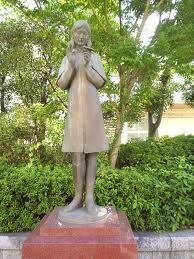I'm happy to report that there is nothing New Age about origami.
Origami is considered a Japanese art form that involves the intricate folding of paper. It's origin is under debate but most believe it came to Japan shortly after paper was introduced to that country by Buddhist monks which occurred in the sixth century AD.
According to the Origami Resource Center , paper was too expensive at first and origami was used sparingly. It was given only on formal occasions such as to accompany a valuable gift or to serve as a certificate of authenticity.
Another form of origami, Tsutsumi consisted of formal gift wrappers with ceremonial folds that symbolized sincerity and purity.
It was not until the 1890's that the art was given the name origami.
"In the 1950, Akira Yoshizana and Sam Randlett developed a standard set of origami symbols to describe how to fold paper into models," the Center reports. "These symbols remained essentially the same and are used in origami diagrams today."
One of the most moving legends associated with Origami is the story of Sadako Sasaki, a girl who was just two kilometers from ground zero during the bombing of Hiroshima. By the age of twelve, she had developed leukemia. A friend visited her in a hospital and taught her how to make a paper crane, telling her of an ancient Japanese belief that whoever folds a thousand origami cranes will be granted whatever they wish by the gods. She set to work folding cranes from whatever paper she could find in the hospital. However, she was only able to fold 644 cranes before her death. Her friends completed the rest of the 1,000, burying the cranes with her.
A statue of Sadako stands in the center of Seattle Peace Park as a memorial to the children who died in Hiroshima and Nagasaki, and as a call for peace and an end to the ravages of war.
Send your New Age questions to newage@womenofgrace.com

